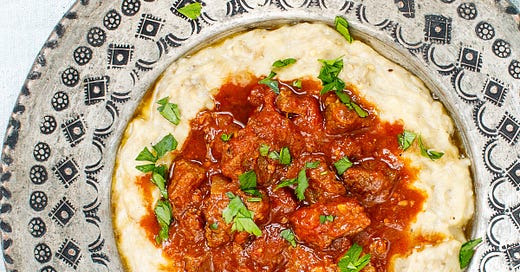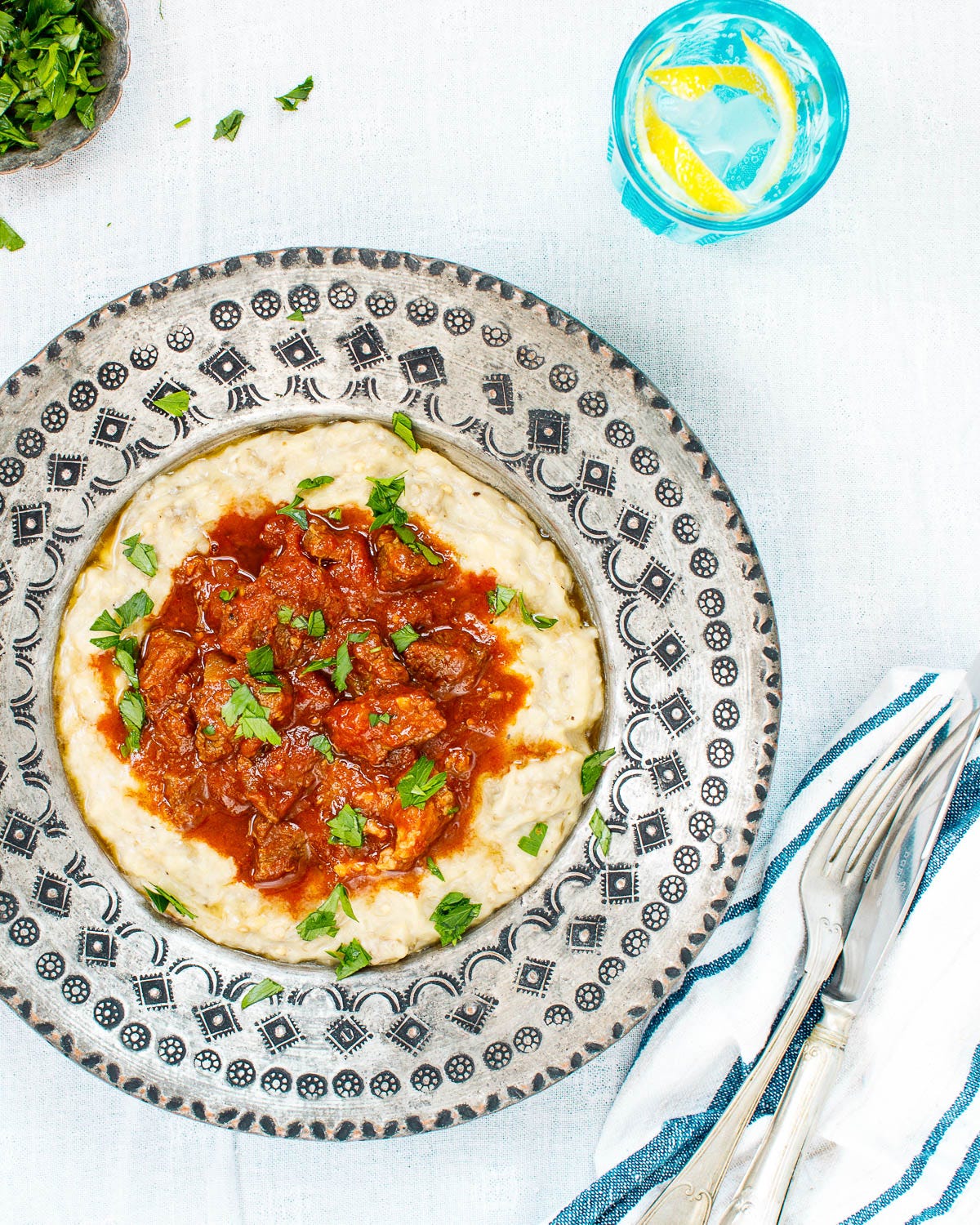Hünkar beğendi
A delicious combination of a simple lamb stew and an aubergine bechamel sauce.
Legend has it this dish came out of a hunting trip, where Sultan Murad IV suddenly became hungry and demanded food. His men found the nearest hut, where the cook was more than willing to oblige in cooking up a meal for the sultan. However, there wasn’t much left in the kitchen. The cook assembled whatever scraps he had – a few aubergines, some meat – and served it to the sultan.
He must have done something right, because at the end of the meal, the sultan called the cook forward, asking for the name of the dish. The cook’s response was honest, explaining that it didn’t have a name, as it had been prepared not according to any recipe, but with what was available in the kitchen at this late hour.
—Then dish shall be known as “hünkar beğendi”, the sultan responded. “The Sultan liked it”.
A nice story, but given the ensemble available to the sultan (he had some 30 chefs and apprentices who always travelled with him), it’s hard to believe there were no dinner plans for the trip. And it’s perhaps equally unbelievable that the random cook thought to mix grilled aubergine with bechamel sauce, a continental sauce with no history in Turkey. A well travelled cook indeed! What’s more, Murad IV lived well over a century before the arrival of the tomato, a key ingredient in the lamb stew that sits on top of the sauce.
An Ottoman/continental flirt
A rather more plausible story of the dish’s origin takes place a couple of centuries later, during the reign of Sultan Abdülaziz. While visiting France after an invitation by Napoleon III, the sultan reportedly falls in love with the emperor’s wife, Eugénie. Once back home, he invites them both to Istanbul, hoping for an occasion to see Eugénie again. Only Eugénie makes it, popping by on the way to the opening of the Suez canal. As one would expect customary of royalty of the time, she brought a large entourage for such a trip. Among them, a few chefs.
The palace chefs keenly observed the foreign chefs as they worked in the palace kitchens. Intrigued by the foreign bechamel sauce, the palace chefs decide to make a homage to their guest by combining this sauce with the local favourite vegetable, grilled aubergine (eggplant), and the Sultan’s favourite stew. And thus the dish of hünkar beğendi was born.
And the love story? If there’s anything to it, it had a sad ending. Their second meeting would also be their last. Eugénie was widowed shortly after returning from her trip, and before long Sultan Abdülaziz died too, long before Eugénie had a chance to return to Istanbul again.
Hünkar beğendi begendi today
At this point, I should mention that Marianna Yerasimos, author of the brilliantly researched 500 Years of Ottoman Cuisine, wasn’t able to confirm the story. In fact, there are noe written sources confirming when this meal was first served in the Ottoman palaces.
What’s certain, however, is that hünkar beğendi is one of the few inventions of the Ottoman palace kitchens that has survived to modern day. It’s not the most widely served food in Turkish cuisine, but most Turks know it. And, needless to say, foreigners love it.
The sauce, mixing bechamel sauce with grilled aubergine, is so good it’s actually taken on its own life, becoming perhaps more popular than the dish it started as a part of. In Turkey, the it’s simply known as “beğendi”, and can be topped with virtually any meat. Seeing “chicken beğendi” or “meatball beğendi” on restaurant menus is not uncommon.
Recipe: Hünkar beğendi
Dinner | Ottoman/Turkish cuisine | Serves 2–3
Ingredients
c. 3 Tbsp olive oil (I use a mild extra virgin)
500 g lamb, cut into 2 cm dice
1 medium onion, roughly chopped
3 garlic cloves, finely chopped
50 g (3½ Tbsp) tomato paste
2 tsp pul biber (Aleppo pepper)
1 tsp sugar
400 g skinned tomatoes, chopped (preferably fresh, but canned will do)
water
a little chopped parsley, to garnish (optional)
salt and pepper
Beğendi sauce
1 kg (2⅕ lbs) (c. 4) aubergine (eggplant)
25 g (1¾ Tbsp) butter
25 g (3⅕ Tbsp) white flour
250 ml (1 cup) whole milk
salt and pepper
How I make it
Grill the aubergines directly on a gas flame, turning regularly, until completely burnt and soft. This usually takes around 10–15 minutes. Cool slightly then peel off the burnt skin. Alternatively, you can roast the aubergines in a very hot oven (250 C/480 F) until completely soft (around 1 hour), but you'll lose most of the smoky flavour that makes the sauce unique.
Meanwhile, heat a thick bottomed wide pot over medium/high heat. Season the lamb pieces with salt and pepper, then brown in batches in the olive oil, using as much oil as needed. Set aside.
Turn the heat down to medium, then fry the onion, stirring regularly, until soft and translucent, but not browned, 8–10 minutes or more.
Add the garlic, tomato paste, pul biber and sugar. Fry for another 1–2 minutes, stirring constantly to avoid burning.
Return the lamb pieces (along with their juices) to the pan alongside the chopped tomatoes and enough water to just cover the meat. Season with salt and pepper, then bring to a boil. Turn the heat down and leave to simmer until the meat is completely tender, 45 minutes to an hour or more, depending on the cut. Leave off the heat for 10–15 minutes before serving.
Meanwhile, place a a large, thick bottomed frying pan or pot over medium heat. Add the butter and, once melted, the flour. Whisk until completely mixed, then add the milk while whisking vigorously. Keep stirring until you have a thick sauce, then season to taste with salt and pepper. Take off the heat. Roughly chop the smoky aubergine and add to the sauce. Taste for seasoning once more.
Add the begendi sauce to serving plates, topping with the lamb stew and a sprinkle of freshly chopped parsley, then serve immediately.
A note
Some recipes add cheese to the beğendi sauce. I don’t, for a simple reason: It’ll very quickly overpower the aubergine, making your sauce taste like a standard cheese bechamel instead of the sultan’s delight.







Very nice and will cook it for a French friend tonight (with the story)
Yes very nice ❤️Thank you
Great for weekend
It takes very long time to cook during the week